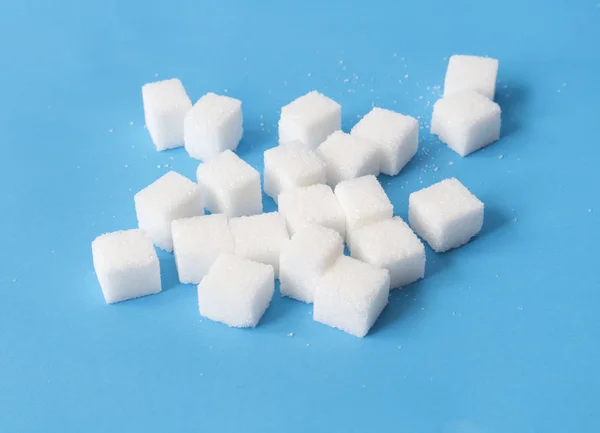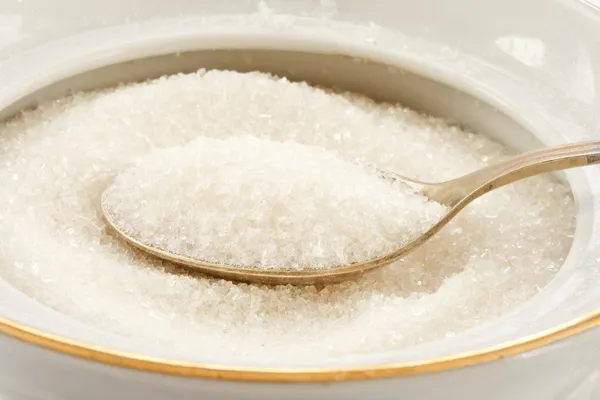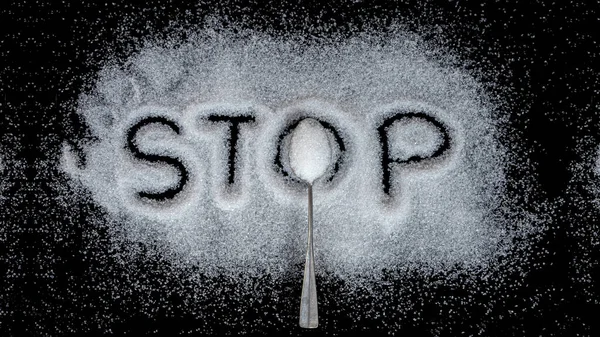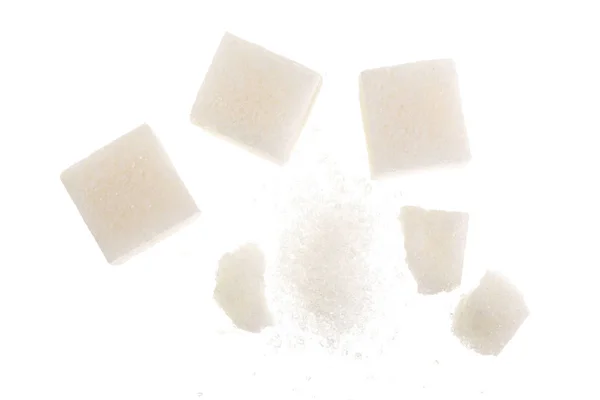
The Dangers of Sugar and How to Cut it Out of Your Diet
We all love sugar. It's sweet, it's delicious, and it's practically irresistible. But did you know that excess sugar consumption can be incredibly dangerous for your health? That's right, that innocent little bag of gummy bears or can of soda could be doing more harm to your body than you ever imagined.
Studies have shown that excessive sugar intake can lead to a host of health problems, from obesity to heart disease to type 2 diabetes. And yet, despite all the warnings, it can be so hard to resist the siren call of sugar. So what's a sugar lover to do?
In this article, we'll dive into the dangers of sugar and how to cut it out of your diet, without sacrificing all the fun and flavor in life. Yes, it's possible to live a sugar-free (or at least sugar-reduced) lifestyle and still enjoy all the delicious food and drinks that make life worth living. We'll cover everything from identifying hidden sugars in your diet to finding sugar alternatives that are actually tasty. So sit back, grab a glass of water (or maybe some herbal tea) and get ready to learn how to kick sugar to the curb once and for all.
The health risks of consuming too much sugar

As we mentioned earlier, consuming excessive amounts of sugar can have serious consequences for your health. For starters, eating too much sugar can lead to weight gain and obesity. When you consume sugar, your body releases insulin, which is a hormone that helps regulate your blood sugar levels. However, when you eat too much sugar, your body can become resistant to insulin, leading to high blood sugar levels and an increased risk of obesity.
But weight gain isn't the only health risk associated with excess sugar consumption. Studies have also shown that sugar can increase your risk of heart disease. In fact, a study published in the Journal of the American Medical Association found that individuals who consumed 17-21% of their daily calories from added sugar had a 38% higher risk of dying from heart disease compared to those who consumed only 8% of their calories from added sugar.
In addition to heart disease, consuming too much sugar has also been linked to type 2 diabetes. When you eat sugar, your body breaks it down into glucose, which is used for energy. However, when you consume too much sugar, your body can become overwhelmed and unable to produce enough insulin to process the glucose. Over time, this can lead to insulin resistance and eventually, type 2 diabetes.
Other health risks associated with excess sugar consumption include tooth decay, inflammation, and an increased risk of certain types of cancer. By cutting down on your sugar intake, you can reduce your risk of these health problems and improve your overall well-being.
How to identify added sugars in your diet

One of the biggest challenges of cutting sugar from your diet is identifying where it's hiding. While it's easy to spot sugar in obvious sources like candy, soda, and baked goods, it's often lurking in other foods that you might not expect. That's why it's important to learn how to identify added sugars in your diet.
The first step is to read the nutrition label on packaged foods. Added sugars can go by many names, so look for terms like cane sugar, high fructose corn syrup, corn syrup, agave nectar, honey, and molasses. Keep in mind that sugar can appear multiple times on the label, under different names, so be sure to check the entire list of ingredients.
Another way to identify added sugars in your diet is to pay attention to the grams of sugar listed on the nutrition label. However, keep in mind that the grams listed include both added sugars and naturally occurring sugars (like those found in fruit and dairy products). To get a better sense of how much added sugar a product contains, check the ingredient list.
Finally, it's important to be aware of common sources of added sugar. Some of the biggest culprits include soda, candy, baked goods, breakfast cereals, energy drinks, and sweetened coffee and tea drinks. Even seemingly healthy foods like yogurt, granola bars, and fruit juice can be loaded with added sugars.
By learning how to identify added sugars in your diet, you can make more informed choices about what you eat and reduce your sugar intake. Remember, cutting back on sugar doesn't mean you have to give up all the foods you love – it's just about being more mindful and making healthier choices.
Alternatives to sugar

Cutting out sugar doesn't mean you have to give up all sweet treats. There are plenty of alternatives to sugar that can satisfy your sweet tooth without the health risks.
One popular alternative is stevia, a natural sweetener derived from the stevia plant. Stevia is much sweeter than sugar, so a little goes a long way. It's also calorie-free and doesn't affect blood sugar levels, making it a great option for people with diabetes or those trying to lose weight.
Another natural sweetener is monk fruit extract, which is derived from the monk fruit. Like stevia, monk fruit extract is calorie-free and doesn't affect blood sugar levels. It has a slightly different taste than sugar, but it can be a great option for people who are looking for a natural alternative.
If you prefer a more traditional sweetener, there are also alternatives like honey and maple syrup. While these do contain calories and sugar, they also have some nutritional value and can be a good alternative to processed sugar. Just be sure to use them in moderation, as they can still have an impact on blood sugar levels.
Finally, you can also experiment with using spices like cinnamon and nutmeg to add natural sweetness to your foods. These spices can help enhance the flavor of fruits, yogurt, and other foods without adding any sugar at all.
By incorporating these alternatives to sugar into your diet, you can still enjoy sweet treats without the health risks of sugar. Experiment with different options to find the ones that work best for you and your taste preferences.
How to cut sugar out of your diet 

Cutting sugar out of your diet can be a challenge, but it's a worthwhile endeavor for your health. Here are some tips to help you reduce your sugar intake and transition to a healthier, sugar-free lifestyle.
Start slowly: If you're used to consuming a lot of sugar, it can be tough to go cold turkey. Start by gradually reducing your sugar intake over time. You might begin by cutting out soda, then move on to limiting your dessert intake, and so on.
Read labels: Many processed foods contain hidden sugars, so it's important to read labels to identify added sugars in your food. Look for words like sucrose, high-fructose corn syrup, and cane sugar. The closer to the top of the ingredient list, the more sugar it contains.
Choose whole foods: The best way to avoid added sugars is to focus on whole foods like fruits, vegetables, and whole grains. These foods are naturally sweet and contain fiber, which can help keep you feeling full and satisfied.
Use sugar substitutes: As we mentioned earlier, there are plenty of sugar substitutes you can use to sweeten your foods without the health risks. Experiment with using stevia, monk fruit extract, or other alternatives to sugar.
Find healthy replacements: If you're used to reaching for sugary snacks, find healthier replacements that can still satisfy your cravings. For example, if you love candy, try snacking on dried fruit instead.
Stay hydrated: Sometimes when we feel hungry, we're actually thirsty. Drinking plenty of water can help you stay hydrated and reduce your sugar cravings.
By taking these steps, you can gradually cut sugar out of your diet and transition to a healthier, sugar-free lifestyle. Remember that it's okay to indulge in sugary treats every now and then, but moderation is key when it comes to your health
The benefits of reducing sugar intake

Reducing your sugar intake has numerous health benefits that can make a big difference in your overall well-being. Here are some of the key benefits of cutting sugar out of your diet.
Weight loss: Sugar is high in calories and can contribute to weight gain. By reducing your sugar intake, you can lower your calorie intake and lose weight more easily.
Lower risk of chronic diseases: High sugar intake is linked to a higher risk of chronic diseases such as diabetes, heart disease, and cancer. By reducing your sugar intake, you can lower your risk of these conditions.
Better energy levels: Consuming too much sugar can lead to spikes and crashes in blood sugar levels, which can leave you feeling tired and lethargic. By cutting sugar out of your diet, you can maintain more stable energy levels throughout the day.
Improved mood: Sugar can also impact your mood, leading to feelings of anxiety and depression. Reducing your sugar intake can help stabilize your mood and improve your overall mental well-being.
Clearer skin: Sugar can also contribute to skin issues like acne and premature aging. By cutting sugar out of your diet, you can enjoy clearer, healthier skin.
Better oral health: Consuming sugary foods and drinks can lead to tooth decay and gum disease. By reducing your sugar intake, you can protect your teeth and gums.
Overall, reducing your sugar intake has numerous health benefits that can improve your quality of life. By making small changes to your diet and lifestyle, you can enjoy the benefits of a healthier, sugar-free lifestyle.
The challenges of cutting sugar out of your diet

Cutting sugar out of your diet can be a daunting task, and there are several challenges that you may encounter along the way. Here are some of the most common challenges of reducing your sugar intake.
Sugar cravings: One of the biggest challenges of cutting sugar out of your diet is dealing with sugar cravings. Sugar is addictive and can be hard to give up. To combat sugar cravings, it's important to have healthy alternatives on hand, such as fresh fruit or natural sweeteners like honey or maple syrup.
Social pressure: Another challenge of cutting sugar out of your diet is dealing with social pressure. Friends and family may not understand why you're making dietary changes and may pressure you to indulge in sugary treats. It's important to communicate your goals and boundaries to your loved ones and stick to your guns.
Hidden sugars: Sugar can be found in many unexpected foods, such as sauces, condiments, and even savory snacks. It can be challenging to identify all the hidden sources of sugar in your diet. To address this, it's important to read food labels carefully and opt for whole, unprocessed foods as much as possible.
Emotional eating: Many people turn to sugary foods as a form of emotional comfort, which can make it difficult to cut sugar out of your diet. To overcome emotional eating, it's important to develop healthy coping mechanisms, such as exercise, meditation, or therapy.
Lack of variety: Cutting sugar out of your diet can sometimes feel limiting, and you may find yourself stuck in a rut with the same foods and flavors. To combat this, it's important to get creative with your meals and experiment with new recipes and ingredients.
While cutting sugar out of your diet can be challenging, the benefits are well worth the effort. By acknowledging the challenges and developing strategies to overcome them, you can successfully reduce your sugar intake and enjoy a healthier, more vibrant life.
Meal planning and sugar-free recipes

One of the best ways to cut sugar out of your diet is to plan your meals in advance and prepare your own sugar-free recipes. Here are some tips for meal planning and some delicious sugar-free recipes to try.
Plan your meals: Meal planning can help you stay on track with your sugar-free goals. Make a weekly meal plan that includes a variety of whole, unprocessed foods, such as vegetables, lean proteins, and healthy fats. Plan out your snacks as well, so that you always have healthy options on hand when hunger strikes.
Prep your meals: Meal prep can save you time and make it easier to stick to your sugar-free plan. Set aside time each week to prepare healthy meals and snacks in advance. Chop vegetables, cook grains and proteins, and portion out snacks so that you can grab and go throughout the week.
Get creative with sugar-free recipes: Cutting out sugar doesn't mean you have to give up flavor. There are many delicious sugar-free recipes that you can try, such as:
Oatmeal with fresh fruit and cinnamon instead of sugar
Greek yogurt with berries and nuts
Grilled chicken with roasted vegetables
Lentil soup with whole-grain bread
Chia seed pudding with coconut milk and vanilla extract
Use natural sweeteners sparingly: If you do want to add sweetness to your meals or snacks, use natural sweeteners like honey, maple syrup, or stevia. Use these sweeteners sparingly and avoid highly processed artificial sweeteners.
By planning your meals, preparing your own food, and getting creative with sugar-free recipes, you can successfully cut sugar out of your diet and enjoy a healthier, more balanced lifestyle.
Sugar and children

Children are especially vulnerable to the negative effects of sugar consumption. In addition to increasing the risk of obesity, tooth decay, and other health issues, too much sugar can lead to hyperactivity and difficulty focusing in children. Here are some important things to keep in mind when it comes to sugar and children.
Be mindful of added sugars: Children often consume more added sugars than adults, primarily through sugary drinks and snacks. Be sure to read nutrition labels and choose products with low or no added sugar.
Encourage healthy snacks: Offer your children a variety of healthy snacks, such as fresh fruit, vegetables with hummus, or nuts and seeds. These snacks provide fiber and nutrients without the added sugar.
Limit sugary drinks: Sugary drinks, including soda, sports drinks, and fruit juice, are a major source of added sugars in children's diets. Encourage your children to drink water or milk instead.
Model healthy eating habits: Children learn by example, so be sure to model healthy eating habits in your own diet. Show your children that it's possible to enjoy delicious, sugar-free meals and snacks.
Talk to your child's doctor: If you're concerned about your child's sugar intake or weight, talk to your child's doctor. They can offer guidance and support to help you and your child develop healthy habits.
By being mindful of added sugars, encouraging healthy snacks, limiting sugary drinks, modeling healthy eating habits, and talking to your child's doctor, you can help your children develop healthy habits and reduce their risk of negative health effects from excessive sugar consumption.
Conclusion
In conclusion, sugar is a ubiquitous ingredient that can be found in many of the foods we consume. While sugar is a natural part of many healthy foods like fruits and vegetables, the consumption of added sugars can have negative impacts on our health. Consuming too much sugar can lead to a range of health problems, including obesity, diabetes, heart disease, and tooth decay.
Reducing sugar intake can be challenging, but it's important to take steps to cut back on added sugars in our diets. By identifying added sugars in our foods, choosing alternatives to sugar, meal planning with sugar-free recipes, and gradually reducing sugar intake, we can make a positive impact on our health.
Cutting back on sugar isn't just important for adults; it's also essential for children's health. By being mindful of added sugars, encouraging healthy snacks, limiting sugary drinks, modeling healthy eating habits, and talking to your child's doctor, we can help our children develop healthy habits and reduce their risk of negative health effects from excessive sugar consumption.
Ultimately, reducing sugar intake is an important step towards a healthier lifestyle. By taking action to reduce our sugar consumption and improve our overall diet, we can improve our health and reduce our risk of many chronic diseases. So, let's take steps today to reduce our sugar intake and live a healthier, happier life.
 Reviewed by jadan
on
February 25, 2023
Rating:
Reviewed by jadan
on
February 25, 2023
Rating:




No comments: